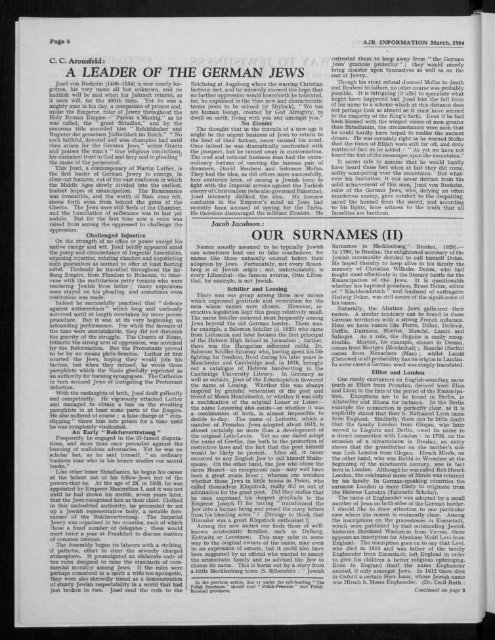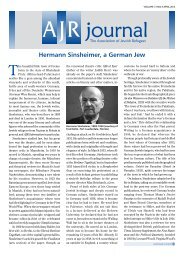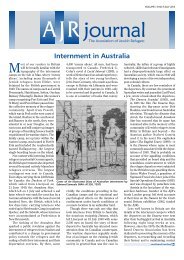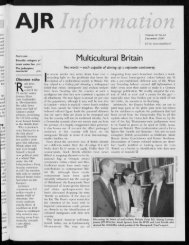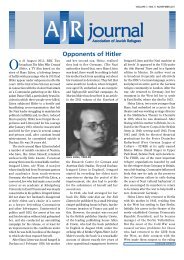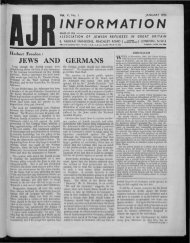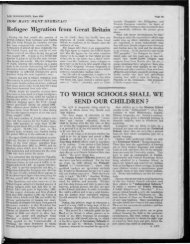our surnames (ii) - The Association of Jewish Refugees
our surnames (ii) - The Association of Jewish Refugees
our surnames (ii) - The Association of Jewish Refugees
Create successful ePaper yourself
Turn your PDF publications into a flip-book with our unique Google optimized e-Paper software.
Page 6 AJR INFORMATION March, 1954<br />
C.C. Aronsfeld:<br />
A LEADER OF THE GERMAN JEWS<br />
Josel von Rosheim (1480-1554) is now nearly forgotten,<br />
his very name all but unknown, and no<br />
kaddish will be said when his Jahrzeit returns, as<br />
it soon will, for the 400th time. Yet he was a<br />
mighty man in his day, a companion <strong>of</strong> princes and,<br />
under the Emperor, ruler <strong>of</strong> Jewry throughout the<br />
Holy Roman Empire—" Parnas u'Manhig," as he<br />
was called, the " great Shtadlan," and by the<br />
sonorous title accorded him " Befehlshaber und<br />
Regierer der gemeinen Judischheit im Reich." " No<br />
such faithful, devoted and wise champion had until<br />
then arisen for the German Jews," writes Graetz<br />
and praises the man's " true religious convictions,<br />
his unshaken trust in God and fiery zeal in pleading "<br />
the cause <strong>of</strong> the persecuted.<br />
This Josel, a contemporary <strong>of</strong> Martin Luther, is<br />
the first leader <strong>of</strong> German Jewry to emerge, in<br />
clear-cut features, out <strong>of</strong> the vast confusion in which<br />
the Middle .\ges slowly divided into the earliest,<br />
frailest hopes <strong>of</strong> emancipation. <strong>The</strong> Renaissance<br />
was irresistible, and the worth <strong>of</strong> Man, once felt,<br />
shone forth even from behind the gates <strong>of</strong> the<br />
Ghetto. <strong>The</strong> Jews were still Serfs <strong>of</strong> the Chamber,<br />
and the humiliation <strong>of</strong> sufferance was to last yet<br />
awhile. But for the first time now a voice was<br />
raised from among the oppressed to challenge the<br />
oppression.<br />
Challenged Injustice<br />
On the strength <strong>of</strong> no <strong>of</strong>fice or power except his<br />
native energy and wit, Josel boldly appeared amid<br />
the pomp and circumstance <strong>of</strong> Imperial .Assemblies,<br />
e.xposing injustice, refuting slanders and negotiating<br />
such guarantees as seemed to <strong>of</strong>fer at least fleeting<br />
relief. Tirelessly he travelled throughout the farflung<br />
Empire, from Flanders to Bohemia, to intervene<br />
with the multifarious petty tyrants who were<br />
rendering <strong>Jewish</strong> lives bitter ; many expulsions<br />
were stayed on his pleading, and sometimes even<br />
restitution was made.<br />
Indeed he successfully practised that " defence<br />
against antisemitism " which long and variously<br />
survived until at length overtaken by more potent<br />
procedure. But it was, at its very beginning, an<br />
astounding performance. For while the fav<strong>our</strong>s <strong>of</strong><br />
the time were unmistakable, they did not diminish<br />
the gravity <strong>of</strong> the struggle. <strong>The</strong> Church <strong>of</strong> Rome,<br />
hitherto the strong arm <strong>of</strong> oppression, was scotched<br />
by the Reformatioru But the Protestants proved<br />
to be by no means philo-Semites. Luther at first<br />
c<strong>our</strong>ted the Jews, hoping they would join his<br />
faction, but when they refused, he wrote those<br />
pamphlets which the Nazis gleefully reprinted as<br />
an authority for burning synagogues. <strong>The</strong> Catholics<br />
in turn accused Jews <strong>of</strong> instigating the Protestant<br />
defection.<br />
With the onslaughts <strong>of</strong> both, Josel dealt gallantly<br />
and competently. He vigorously attacked Luther<br />
and managed to obtain a ban on the revolting<br />
pamphlets in at least some parts <strong>of</strong> the Empire.<br />
He also suffered <strong>of</strong> c<strong>our</strong>se ; a false charge <strong>of</strong> " coinclipping<br />
" threw him into prison for a time until<br />
he was completely vindicated.<br />
An Early " Reichsverfretung "<br />
Frequently he engaged in the ill-famed disputations,<br />
and more than once prevailed against the<br />
learning <strong>of</strong> malicious adversaries. Yet he was no<br />
scholar but, as he said himself, " an ordinary<br />
business man who in his leisure studies <strong>our</strong> sacred<br />
books."<br />
Like other lesser Shtadlanim, he began his career<br />
at the behest not <strong>of</strong> his fellow-Jews but <strong>of</strong> the<br />
powers-that-be. At the age <strong>of</strong> 23, in 1503, he was<br />
appointed by Emperor Maximilian I, and it was not<br />
until he had shown his mettle, seven years later,<br />
that the Jews recognised him as their chief. Clothed<br />
in this undoubted authority, he proceeded to set<br />
up a <strong>Jewish</strong> representative body, a notable forerurmer<br />
<strong>of</strong> the Reichsvertretung. <strong>The</strong> Imperial<br />
Jewry was organised in ten counties, each <strong>of</strong> which<br />
chose a fixed number <strong>of</strong> delegates ; these would<br />
meet twice a year at Frankfurt to discuss matters<br />
<strong>of</strong> common interest.<br />
<strong>The</strong> .Assembly began its lab<strong>our</strong>s with a striking,<br />
if pathetic, effort to clear the severely charged<br />
atmosphere. It promulgated an elaborate code <strong>of</strong><br />
ten rules designed to raise the standards <strong>of</strong> commercial<br />
morality among Jews. If the rules were<br />
perhaps conceived in a spirit a trifle too apologetic,<br />
they were also shrewdly timed as a demonstration<br />
<strong>of</strong> stnrdy <strong>Jewish</strong> respectability in a world that had<br />
just broken in two. Josel read the code to the<br />
Reichstag at Augsburg where the warring Christian<br />
factions met, and he solemnly avowed the hope that<br />
no further oppression would henceforth be tolerated,<br />
for, he explained in the then new and characteristic<br />
terms (soon to be echoed by Shylock), " We too<br />
are human beings, created by God Almighty, to<br />
dwell on earth, living with you and amongst you."<br />
No Zionist<br />
<strong>The</strong> thought that in the travails <strong>of</strong> a new age it<br />
might be the urgent business <strong>of</strong> Jews to return to<br />
the land <strong>of</strong> their fathers, never crossed his mind.<br />
Once indeed he was dramatically confronted with<br />
the prospect, but he turned away in consternation.<br />
<strong>The</strong> cool and rational business man had the extraordinary<br />
fortune <strong>of</strong> meeting the famous pair <strong>of</strong><br />
dreamers, David Reubeni and Solomon Molho.<br />
<strong>The</strong>y had the idea, as did others more successfully,<br />
f<strong>our</strong> centuries later, <strong>of</strong> raising a <strong>Jewish</strong> force to<br />
fight with the Imperial armies against the Turkish<br />
enemy <strong>of</strong> Christendom (who also governed Palestine).<br />
Josel intensely disliked the idea. He foresaw<br />
confusion in the Emperor's mind as Jews had<br />
recently been accused <strong>of</strong> spying for the Turks.<br />
He therefore disc<strong>our</strong>aged the militant Zionists. He<br />
Jacob Jacobson:<br />
entreated them to keep away from " the German<br />
Jews' gracious protector" ; they would merely<br />
bring disaster upon themselves as well as on the<br />
rest <strong>of</strong> Jewry.<br />
Though his stout refusal doomed Molho to death<br />
and Reubeni to failure, no other c<strong>our</strong>se was probably<br />
possible. It is intriguing (if idle) to speculate what<br />
might have happened had Josel lent the full force<br />
<strong>of</strong> his name to a scheme which at this distance does<br />
not perhaps look as absurd as it must have seemed<br />
to the majority <strong>of</strong> the King's Serfs. Even if he had<br />
been blessed with the winged vision <strong>of</strong> men greater<br />
than Shtadlanim, the circumstances were such that<br />
he could hardly have hoped to realise the ancient<br />
dream. He was certainly right as he warned Molho<br />
that the times <strong>of</strong> Ehjah'were still far <strong>of</strong>f, and drily<br />
matter-<strong>of</strong>-fact as he added : "As yet we have not<br />
heard the feet <strong>of</strong> the messenger upon the mountains."<br />
It seems safe to assume that he would hardly<br />
have heard those feet when at last they did come,<br />
s<strong>of</strong>tly scampering over the mountains. But whatever<br />
his limitation, it can never detract from the<br />
solid achievement <strong>of</strong> this man, Josel von Rosheim,<br />
ruler <strong>of</strong> the German Jews, who, defying an <strong>of</strong>ten<br />
murderous enemy, gave comfort to the despairing,<br />
saved the hunted from the sword, and according<br />
to his lights, bore witness to the truth that all<br />
Israelites are brethren.<br />
OUR SURNAMES (II)<br />
Names usually assumed to be typically <strong>Jewish</strong><br />
can sometimes lead one to false conclusions, for<br />
names like these naturally existed before their<br />
adoption by Jews. Fortunately, not every Rosenberg<br />
is <strong>of</strong> <strong>Jewish</strong> origin ; nor, unfortunately, is<br />
every Lilienthal—the famous aviator. Otto Lilienthal,<br />
for example, is not <strong>Jewish</strong>.<br />
Schiller and Lessing<br />
<strong>The</strong>re was one group among these new names<br />
which expressed gratitude and veneration for the<br />
men whose names were chosen. However, restrictive<br />
legislation kept this group relatively small.<br />
<strong>The</strong> name Schiller occurred most frequently among<br />
Jews beyond the old German border. <strong>The</strong>re was,<br />
for example, a Salomon Schiller (d. 1925) who came<br />
from Lithuania and later became the first principal<br />
<strong>of</strong> the Hebrew High School in Jerusalem ; further,<br />
there was the Hungarian reformist rabbi. Dr.<br />
Salomon Schiller-Szinessy who, having spent his life<br />
fighting for freedom, lived during his later years in<br />
Manchester and Cambridge and, in 1876, brought<br />
out a catalogue <strong>of</strong> Hebrew handwriting in the<br />
Cambridge University Library. In Germany as<br />
well as outside, Jews <strong>of</strong> the Emancipation fav<strong>our</strong>ed<br />
the name <strong>of</strong> Lessing. Whether this was always<br />
inspired by grateful veneration <strong>of</strong> the poet and<br />
friend <strong>of</strong> Moses Mendelssohn, or whether it was only<br />
a modification <strong>of</strong> the original Lesser or Leiser—<br />
the name Leysering also exists—or whether it was<br />
a combination <strong>of</strong> both, is almost impossible to<br />
decide to-day. <strong>The</strong> name <strong>of</strong> Leibnitz, which a<br />
number <strong>of</strong> Prenzlau Jews adopted about 1812, is<br />
almost certainly no more than a development <strong>of</strong><br />
the original Leib-Levin. Yet no one dared adopt<br />
the name <strong>of</strong> Goethe, due both to the protection <strong>of</strong><br />
restrictive laws and the fact that the poet himself<br />
would be likely to protest. After all, it never<br />
occurred to any English Jew to call himself Shakespeare.<br />
On the other hand, the Jew who chose the<br />
name Mozart—an exceptional case—may well have<br />
been a great music lover ; whereas one wonders<br />
whether those Jews in little towns in Posen, who<br />
called themselves Klopstock, really did so out <strong>of</strong><br />
admiration for the great poet. Did they realise that<br />
he once expressed his deepest gratitude to the<br />
Emperor Joseph II for having " transformed the<br />
Jew into a human being and prised the rusty fetters<br />
from his bleeding arms " ? (Strange to think that<br />
Himmler was a great Klopstock enthusiast !)<br />
Among the new names one finds those <strong>of</strong> wellknown<br />
aristocratic families, such as Dalberg,<br />
Kottwitz or Levetzow. This may refer in some<br />
way to the original owners <strong>of</strong> the name, may even<br />
be an expression <strong>of</strong> esteem, but it could also have<br />
been suggested by an <strong>of</strong>ficial who wanted to annoy<br />
the aristocratic family and so advised the Jew to<br />
choose its name. This is borne out by a story from<br />
a little Mecklenburg town (S. Silberstein : ' <strong>Jewish</strong><br />
In the previous article, line 11 under the sub-heading " <strong>The</strong><br />
Polish Provinces " should read " FoU&h-Prussian " (not Polish-<br />
Russian) provinces.<br />
Surnames in Mecklenburg," Breslau, 1929).—<br />
In 1790, in Breslau, the enlightened secretary <strong>of</strong> the<br />
<strong>Jewish</strong> community decided to call himself Dohm.<br />
He hoped thereby to keep alive in his family the<br />
memory <strong>of</strong> Christian Wilhelm Dohm, who had<br />
fought most effectively in the literary battle for the<br />
Emancipation <strong>of</strong> the Jews. It is questionable<br />
whether his baptised grandson, Ernst Dohm, editor<br />
<strong>of</strong> " Kladderadatsch " and husband <strong>of</strong> suffragette<br />
Hedwig Dohm, was still aware <strong>of</strong> the significance <strong>of</strong><br />
his name.<br />
Naturally, the .Alsatian Jews gallicized their<br />
names. A similar tendency can be found in those<br />
German territories with a .strong French influence.<br />
Here we have names like Pierre, Dillon, Dellevie,<br />
DeflSis, Dufrasne, Mortier, Manchc, Lande and<br />
Salingre. As a rule, the disguise is easily recognisable.<br />
Mortier, for example, chosen in Dessau,<br />
comes from Mortgen (Mordechai) ; Manche (Berlin)<br />
comes from Menachem (Man) ; whilst Lande<br />
(Ostrowo) in all probability has its origins in Landau.<br />
In some cases a German word was simply translated.<br />
Elliot and London<br />
One rarely encounters an English-sounding name<br />
(such as Elliot from Prenzlau, derived from Elias<br />
and Lion) in the lists <strong>of</strong> the period <strong>of</strong> the Emancipation.<br />
Exceptions are to be found in Berlin, in<br />
Altstrelitz and Rhena for instance. In the Berlin<br />
example the connection is perfectly clear, as it is<br />
explicitly stated that Beer b. Nathaniel Lyon came<br />
from England. Similarly, there can be little doubt<br />
that the family London from Glogau, who later<br />
moved to Liegnitz and Berlin, owed its name to<br />
a direct coimection with London : in 1793, on the<br />
occasion <strong>of</strong> a circumcision in Breslau, an entry<br />
shows that the grandfather on the mother's side<br />
was Leib London from Glogau. Hirsch Mirels, on<br />
the other hand, who was Rabbi in Wreschen at the<br />
beginning <strong>of</strong> the nineteenth century, was in fact<br />
born in London. Although he was called Reb Hirsch<br />
London, the celebrated name <strong>of</strong> Mirels was retained<br />
by his family. In German-speaking countries the<br />
surname London is more likely to originate from<br />
the Hebrew Lamdan (Talmudic Scholar).<br />
<strong>The</strong> name <strong>of</strong> Englaender was adopted by a small<br />
number <strong>of</strong> Jews on both sides <strong>of</strong> the German border.<br />
I should like to draw attention to one particular<br />
ca.se where the reason is eminently clear. .Among<br />
the inscriptions on the gravestones in Eisenstadt,<br />
which were published by that outstanding <strong>Jewish</strong><br />
historian Bernhard Wachstein from Vienna, there<br />
appears an inscription for Abraham Wolff Levi from<br />
England. <strong>The</strong> inscription goes on to say that Levi,<br />
who died in 1810 and was father <strong>of</strong> the family<br />
Englaender from Eisenstadt, left England in order<br />
to give his children a better religious upbringing.<br />
Even in England itself the name Englaender<br />
existed, if only amongst Jews. In 1812 there died<br />
in Oxford a certain Herz Isaac, whose <strong>Jewish</strong> name<br />
was Hirsch b, Moses Englaender. (Dr. Cecil Roth ;<br />
Continued on page 8


